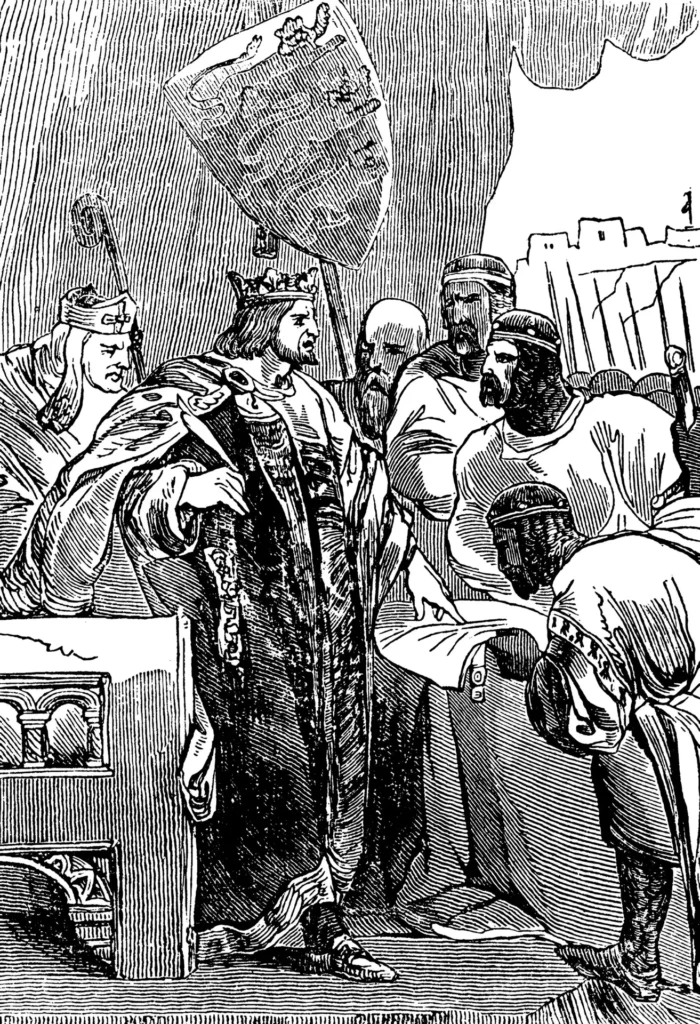The Magna Carta: A Cornerstone of Modern Democracy
Background and Causes
The Magna Carta was signed during a turbulent time in English history, marked by political conflict, heavy taxation, and widespread dissatisfaction with King John’s rule.
- Reign of King John:
King John’s reign (1199-1216) saw a series of military failures, including the loss of key territories in France. To fund his campaigns, he imposed heavy taxes on his subjects, especially the land-owning barons. These taxes, along with his arbitrary use of power, fueled widespread resentment.
- Feudal Tensions:
- England was a feudal society where barons held estates in return for military service to the king. However, King John’s constant demands for money and soldiers, along with arbitrary property seizures and unfair punishments, created tensions. The barons began questioning his authority and demanded reforms.
- Rebellion of the Barons:
- By 1215, baronial discontent reached a tipping point. The barons rebelled and demanded a charter to limit King John’s powers and protect their rights. Facing rebellion and civil war, King John met the barons at Runnymede near the River Thames to negotiate. The result was the Magna Carta.
- 4o
Key Provisions
Although the Magna Carta initially aimed to address the barons’ specific grievances, it introduced broader principles that now serve as the foundation of modern democratic governance. The original document included 63 clauses, with a few standing out as particularly significant.
The Rule of Law
The Magna Carta established the crucial principle that no one, including the king, is above the law. Clause 39 famously states:
No free man shall be seized or imprisoned, or stripped of his rights or possessions, or outlawed or exiled, or deprived of his standing in any other way, nor will we proceed with force against him, or send others to do so, except by the lawful judgment of his equals or by the law of the land.
Broader Impacts
Habeas Corpus:
The Magna Carta introduced the concept of habeas corpus, protecting individuals from unlawful imprisonment. While the term isn’t present in the original text, its clauses on lawful judgment and due process ensure that authorities cannot detain people without legal justification.
Limited Monarchical Power:
The Magna Carta also laid the foundation for limiting the king’s powers and introduced the need for consultation with subjects. For instance, Clause 12 required the king to seek the “common counsel” of the realm before imposing new taxes. This principle eventually helped develop Parliament and the idea of taxation with representation.
Protection of Property Rights:
Several clauses protected the property rights of free men and barons, preventing the king from arbitrarily seizing land or property without legal justification.
Fair Trials and Justice:
The Magna Carta emphasized the right to fair trials and access to justice. It ensured that courts and judges, rather than the king, determined guilt or innocence, establishing a fairer system of justice.
Immediate Impact of the Magna Carta
The Magna Carta did not have an immediate, lasting effect on King John’s rule. Shortly after its signing, King John sought to annul the charter, and civil war broke out between the barons and the monarchy. However, rulers reissued the Magna Carta several times after King John’s death in 1216, particularly during the reign of his son, Henry III. Over time, lawmakers adopted and expanded its principles, shaping the evolution of English law and governance.
The Magna Carta’s Influence on Modern Democracies
The Magna Carta, originally focused on barons’ rights, has a legacy far beyond its feudal context. Its core ideas—rule of law, due process, and limited government power—have profoundly influenced constitutional law and democracy worldwide.
- The English Bill of Rights (1689):
- The Magna Carta’s emphasis on limiting monarchical power and ensuring the rights of subjects directly influenced the English Bill of Rights, which was passed in 1689. This document further established the principles of constitutional monarchy, individual rights, and parliamentary sovereignty.
- Influence on the United States:
- The Magna Carta had a significant influence on the founding fathers of the United States. Its principles were embedded in the U.S. Constitution and the Bill of Rights. The American colonists cited the Magna Carta when they rebelled against British rule, emphasizing their right to representation and protection from arbitrary governance. Concepts such as due process, habeas corpus, and the right to a fair trial are direct legacies of the Magna Carta.
- International Human Rights:
- The Magna Carta’s enduring legacy also appears in international human rights documents, such as the Universal Declaration of Human Rights (1948), which emphasizes the rule of law, protection of individual freedoms, and the right to a fair trial.
Legacy of the Magna Carta
Many regard the Magna Carta as one of the most important legal documents in the history of democracy and constitutional law. Although it originally aimed to address the concerns of the barons, its broader principles have inspired generations of reformers and revolutionaries in their pursuit of justice and liberty.
- Symbol of Freedom:
- The Magna Carta has become a symbol of the struggle for freedom and justice. Its principles have been invoked by leaders such as Nelson Mandela and Winston Churchill in the fight against oppression and tyranny.
- Foundations of Legal Tradition:
- Many modern legal traditions, including the separation of powers, the right to trial by jury, and protections against arbitrary government actions, have roots in the Magna Carta. These principles remain cornerstones of democratic governance and individual rights today.
